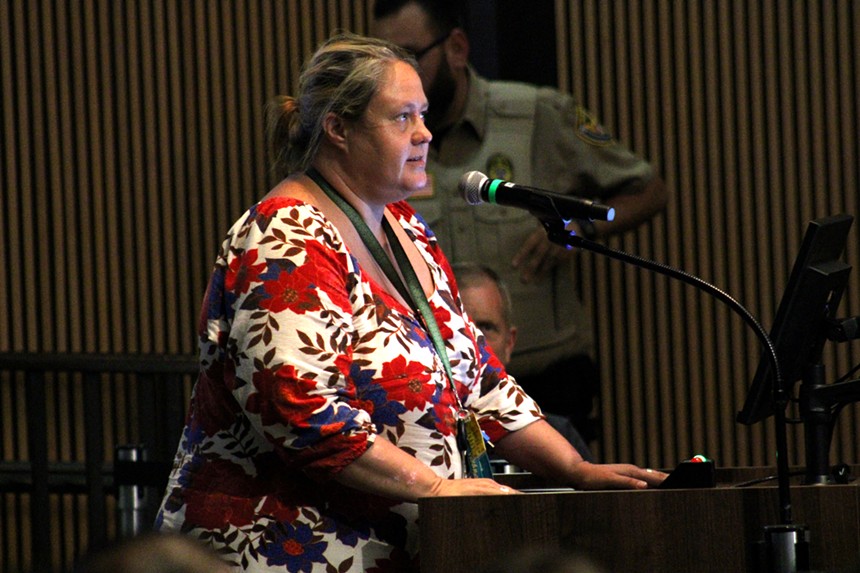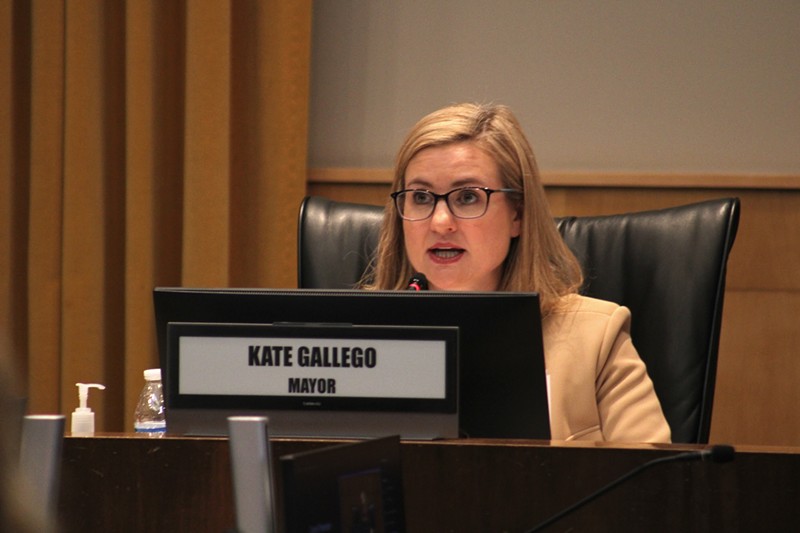A consent decree would mandate certain reforms while subjecting the department to independent monitoring. Even before the report’s release in July, the city has attempted to strike a tone of taking its police department’s issues seriously while arguing that a consent decree is both unnecessary and too expensive for taxpayers.
In a city council meeting that lasted longer than four hours, the council unanimously approved three items related to public safety improvements and staffing for the Office of Homeless Solutions and police. The projects are just the beginning of the council’s police reforms as they continue to negotiate with the DOJ about the future of the city’s police.
Councilmember Carlos Galindo-Elvira said Tuesday night’s unanimous votes were “a positive sign to the residents of Phoenix that we are taking action.”
“We understand the findings by the Department of Justice,” he told Phoenix New Times. “We know that we cannot deny, delay or dodge our responsibility out of it. This is a good first step.”
Galindo-Elvira expects work on police reform to continue through two relatively new bodies the city founded to hold police accountable. One is the city’s civilian review board, which is not yet seated. The other is the Office of Accountability and Transparency, which investigates police incidents but whose first director resigned earlier this year.
But Galindo-Elvira does not support a consent decree and said his constituents in District 7, which spans from downtown Phoenix to Avondale, don’t support one either.
“They do not want the federal government coming in and taking over our police department,” he said.
The reforms passed by the council on Tuesday included:
- Spending $500,000 to hire a four-person “compliance analyst team” within the police department to develop reforms and update police policy based on the recommendations made in the DOJ report.
- The conversion of 14 part-time staffers in the city’s homeless solutions department to full-time status, which the council projected will cost approximately $2.5 million annually.
- Approving a proposed cycle of reform, explained with a rainbow flow chart by Police Chief Michael Sullivan, that emphasizes policy reform, increased training, transparency, oversight and compliance.

Elizabeth Venable, co-founder of Fund for Empowerment, was skeptical that measures approved by the Phoenix City Council to curb police abuses of unhoused people would be effective.
Morgan Fischer
‘Cannot trust the Phoenix Police Department’
The council also unanimously passed a measure to stop police from trashing homeless individuals’ belongings, a direct response to allegations leveled in the DOJ’s report. However, advocates for the unhoused see the city and police only skirting responsibility.“I’ll believe it when I see it,” Fund for Empowerment co-founder Elizabeth Venable told New Times.
Frank Urban echoed that skepticism. He said when he was living on the streets, Phoenix police threw out his personal belongings — including his social security card, birth certificate, pillow and more — on more than 10 occasions.
“City Council basically gave a last-ditch effort in hopes that they would fool us so they wouldn’t have to go along with the DOJ,” Urban said.
Urban spoke during the meeting’s public comment section, telling councilmembers that “the police should not be trusted to reform themselves, they need oversight. Phoenix police cannot be trusted with anything, let alone the homeless.”
He was hardly alone. Dozens of community members addressed the council in two-minute increments to speak against the measures, arguing that more money shouldn’t be spent on police. The DOJ’s report outlined a history of violence, unconstitutional policing and excessive uses of force. Resident after resident shared personal stories of being brutalized by police, the police violence experienced by their family members and their eroding faith in the system to keep them safe.
“We cannot trust Phoenix Police Department to reform themselves, or we would not have to be here in the first place,” Phoenix resident Stephanie Gonzalez said.
Some residents want a consent decree, while police reform groups have doubts about their efficacy. Last month, Poder in Action Executive Director Viri Hernandez told New Times that consent decrees historically have addressed the problem of bad policing the wrong way.
"We want the city to focus on solving root cause issues," she said. "We don’t need police to respond to all the things they’re responding to. We don’t need them to have more weapons, we don’t need them to have more training."
Even with Tuesday’s reforms, though, it seems unlikely that Phoenix will avoid federal oversight. In a meeting with community members in late August, DOJ attorneys made it clear they’re prepared to sue the city in federal court if an agreement cannot be reached.
“We have authority to sue,” DOJ attorney Jorge Castillo said during the meeting, “and we’ve used it.”













